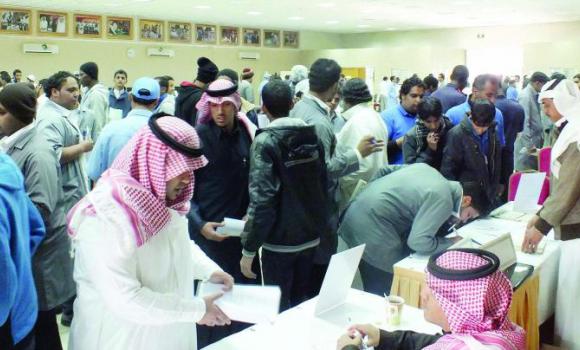
Jeddah, Jan 17: Calls are mounting for the government to repeal the proposed levy for businesses not meeting Saudization requirements. Analysts have said that implementing the measure will impose an additional economic burden of some SR60 billion annually on Saudi families across the country.
Employers are now forced to pay SR2,400 a year for each foreign worker that pushes the work force at a particular company over the 50 percent target mandated by Saudization laws.
Talal Samarkandi, head of the Engineering Firm Committee at the Jeddah Chamber of Commerce and Industry, said his panel would come out with a detailed study that would convince authorities of the need to abolish the levy.
The move comes after Crown Prince Salman, deputy premier and minister of defense, instructed the Council of Saudi Chambers to submit a report on the levy’s impact on both individuals and the national economy.
Many companies have delayed renewing their foreign employees’ iqamas because of the newly imposed fees. Employers now must pay annually SR 2,600 in labor fees for each foreigner over the 50 percent mandate instead of SR100 for all workers’ renewed iqamas, which was the case previously.
Samarkandi said the government would be able to mobilize SR19 billion annually from the new fees. “As a result of the additional expenditures, traders and businesses will increase the prices of their goods and services by three to five times and consumers will be the main victims.”
Many companies, especially contractors and labor suppliers have already increased their charges. Samarkandi estimated the increase in prices of goods after the imposition of the levy at 10 to 20 percent.
There are about 10 million expatriate workers in the Kingdom including those who have overstayed their visas and other undocumented workers. About 3 million expatriates work as house servants while 7 million work in the service and industrial sector.
The new levy would increase the expenditure of businesses by SR20 billion annually. “To meet this expenditure, traders will increase prices of goods and services by three times and the cost will reach SR60 billion,” Samarkandi explained.
“If we distribute this amount among 2.4 Saudi families with seven members in each family, the cost per family comes to SR10,000 every year or SR1,800 per month,” he pointed out.
“This has become a new cost of living increase for Saudis, and the Ministry of Labor has not taken this into consideration when imposing the levy on private companies,” he pointed out.
He said the ministry was just thinking of how to manage the fund required for paying unemployment allowance without checking its negative implications.
Muhiyuddin Al-Hekami, assistant secretary-general of JCCI, said the organization would calculate the damage caused by the levy on various sectors. “It is our duty to protect the interests of businesses in the city.”
Al-Hekami said the chamber had received complaints against the levy from traders, businessmen and industrialists. “We’ll present a detailed report to higher authorities to take appropriate action,” he said.
Nasser Al-Zahem, head of the Health Services Committee, said the Labor Ministry has to clarify whether the new fees are an expat tax. The health sector, which does not receive an adequate number of qualified Saudis, has been suffering big losses as a result of the new decisions, he pointed out. The levy, he said, would force many small companies to leave the market. “They should consider that the private sector is part and parcel of the state,” he added.
Crown Prince Salman called for studying the issue following a meeting with a business delegation led by Abdullah Al-Mubti, president of the Council of Saudi Chambers.
During that meeting, the CSC delegation explained the negative aspects of the Labor Ministry's decision. Prince Salman emphasized the need to protect national interests. The delegation vowed to employ more Saudis in private companies.
In a previous statement, Labor Minister Adel Fakeih said there was no plan to cancel the levy, which was imposed to bridge the gap between the cost of employing expatriates and Saudis, raising the cost of foreign labor. “This is not a ministry decision, it’s a Cabinet decision,” the minister said.
Saleh Hefni, CEO of Halwani Bros Company, said the levy would contribute to increasing inflation rather than nationalizing jobs. “This tax proposal, I think, will not stop the private sector’s dependence on expatriate workers, rather they will try to cover the cost of expatriate workers by increasing the prices of the products they produce and sell in the market,” he added.






Comments
Add new comment